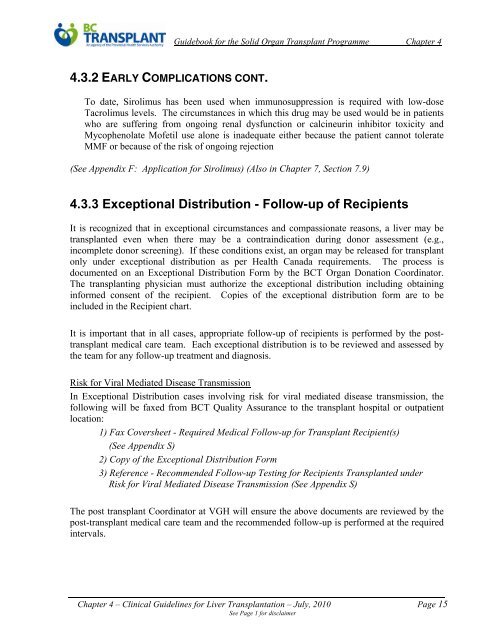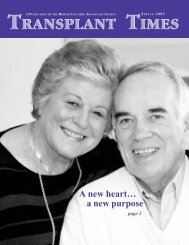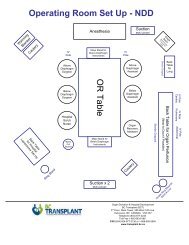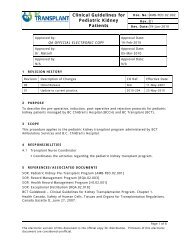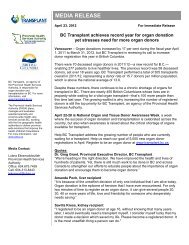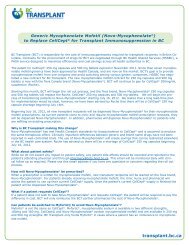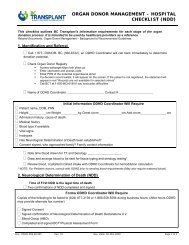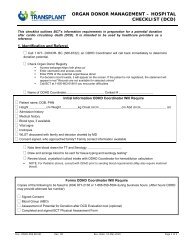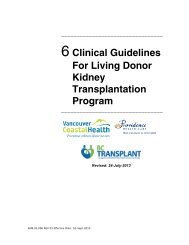4. Clinical Guidelines for Liver Transplantation (PDF) - British ...
4. Clinical Guidelines for Liver Transplantation (PDF) - British ...
4. Clinical Guidelines for Liver Transplantation (PDF) - British ...
You also want an ePaper? Increase the reach of your titles
YUMPU automatically turns print PDFs into web optimized ePapers that Google loves.
Guidebook <strong>for</strong> the Solid Organ Transplant Programme Chapter 4<br />
<strong>4.</strong>3.2 EARLY COMPLICATIONS CONT.<br />
To date, Sirolimus has been used when immunosuppression is required with low-dose<br />
Tacrolimus levels. The circumstances in which this drug may be used would be in patients<br />
who are suffering from ongoing renal dysfunction or calcineurin inhibitor toxicity and<br />
Mycophenolate Mofetil use alone is inadequate either because the patient cannot tolerate<br />
MMF or because of the risk of ongoing rejection<br />
(See Appendix F: Application <strong>for</strong> Sirolimus) (Also in Chapter 7, Section 7.9)<br />
<strong>4.</strong>3.3 Exceptional Distribution - Follow-up of Recipients<br />
It is recognized that in exceptional circumstances and compassionate reasons, a liver may be<br />
transplanted even when there may be a contraindication during donor assessment (e.g.,<br />
incomplete donor screening). If these conditions exist, an organ may be released <strong>for</strong> transplant<br />
only under exceptional distribution as per Health Canada requirements. The process is<br />
documented on an Exceptional Distribution Form by the BCT Organ Donation Coordinator.<br />
The transplanting physician must authorize the exceptional distribution including obtaining<br />
in<strong>for</strong>med consent of the recipient. Copies of the exceptional distribution <strong>for</strong>m are to be<br />
included in the Recipient chart.<br />
It is important that in all cases, appropriate follow-up of recipients is per<strong>for</strong>med by the posttransplant<br />
medical care team. Each exceptional distribution is to be reviewed and assessed by<br />
the team <strong>for</strong> any follow-up treatment and diagnosis.<br />
Risk <strong>for</strong> Viral Mediated Disease Transmission<br />
In Exceptional Distribution cases involving risk <strong>for</strong> viral mediated disease transmission, the<br />
following will be faxed from BCT Quality Assurance to the transplant hospital or outpatient<br />
location:<br />
1) Fax Coversheet - Required Medical Follow-up <strong>for</strong> Transplant Recipient(s)<br />
(See Appendix S)<br />
2) Copy of the Exceptional Distribution Form<br />
3) Reference - Recommended Follow-up Testing <strong>for</strong> Recipients Transplanted under<br />
Risk <strong>for</strong> Viral Mediated Disease Transmission (See Appendix S)<br />
The post transplant Coordinator at VGH will ensure the above documents are reviewed by the<br />
post-transplant medical care team and the recommended follow-up is per<strong>for</strong>med at the required<br />
intervals.<br />
Chapter 4 – <strong>Clinical</strong> <strong>Guidelines</strong> <strong>for</strong> <strong>Liver</strong> <strong>Transplantation</strong> – July, 2010 Page 15<br />
See Page 1 <strong>for</strong> disclaimer


